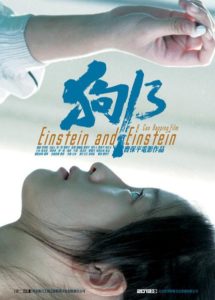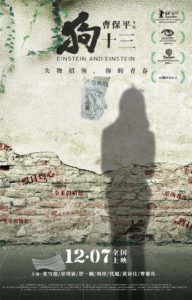Einstein and Einstein
狗13
China, 2013, colour, 2.35:1, 119 mins.
Director: Cao Baoping 曹保平.
Rating: 7/10.
Offbeat coming-of-age movie boasts a remarkable performance by its young lead actress.
Xi’an, central China, the present day. Loner Li Wan (Zhang Xueying), a moody, rather spoilt 12-year-old who lives with her grandparents (Zhi Yitong, Zhou Zhen), is enrolled by her father (Guo Jinglin) in middle school. Since he divorced and remarried another woman (Cao Xinyue), Li Wan has grown apart from her father, who is always busy with work and still hasn’t dared tell her he has a young son by his new wife. To placate her, her father leaves her the gift of a young puppy dog one day; initially hostile to it, she gradually comes to love it, naming it Einstein. Li Wan is distraught when Einstein runs off one day while her grandfather is walking it; she searches everywhere with her cousin Li Tang (Huang Shijia) but can’t find it. Then, in response to her “dog missing” flyers, her stepmother brings Einstein back – but Li Wan insists the dog is a lookalike, not Einstein, and has another tantrum, to the despair of everyone. Eventually, however, she bonds with the dog, and her relationship with her father improves. He then decides it’s time to gently break the news that she has a baby half-brother, Li Zhao.
REVIEW
A remarkable performance by 16-year-old TV actress Zhang Xueying 张雪迎, who makes a potentially tiresome character into a sympathetic protagonist, is just one of the subtleties in coming-of-age movie Einstein and Einstein 狗13. On the surface it seems unlikely material for Shanxi-born Cao Baoping 曹保平, 45, an experienced TV writer-director who made a mark in feature films with the lively black comedies Trouble Makers 光荣的愤怒 (2006) and The Equation of Love and Death 李米的猜想 (2008), both of which vividly portrayed modern Mainland society in offbeat, exaggerated ways. With its realist, non-comedic style, Einstein is very different, so it’s little surprise to find that, for the first time, the script is by another writer – Jiao Huajing 焦华静, previously credited as co-writer on the troubled but charmingly light rom-com The Pretending Lovers 假装情侣 (2011), with Huang Bo 黄渤 and Jiang Yiyan 江一燕. The change of tone seems largely ascribable to her, and in fact the script – as well as its English title – derives from the young writer’s graduation screenplay at Beijing Film Academy, when it was known in Chinese as 爱因斯坦与爱因斯坦.
Set in Jiao’s own hometown of Xi’an, central China, Einstein starts as if it’s going to be a cute pet movie: Li Wan, a moody, rather spoilt girl, who lives with her grandparents and has just enrolled at high school, is given a puppy by her father, with whom she’s had a problematic relationship ever since he divorced and remarried. Initially hostile to the mutt but then growing attached to it, naming it Einstein (from her interest in astrophysics), Li Wan throws a major tantrum when it disappears one day and refuses to accept that the dog her elders subsequently find is the original Einstein. However, it becomes clear early on that the film isn’t going to be a girl-and-her-puppy tear-jerker, and certainly not along the saccharine lines of Japanese or South Korean pet movies.
For a start, there’s a realist approach in both Cao’s direction and Jiao’s script – along with a practical, very Chinese attitude towards animals – that steers the girl/dog relationship away from sentimentality. Also, the human side – Li Wan’s relationship with her father, grandparents and best friend (her cousin, Li Tang) – is just as important as the animal one. It’s soon apparent that, beneath its everyday, dramatically low-key surface, Einstein is a highly original take on coming-of-age movies, with the dog(s) taking the place of first love(s) in Li Wan’s evolution from a lonely, self-centred, single child to a more mature young adult accepting of compromise. In the beautifully drawn coda, it’s clear that Li Wan will never forget the original Einstein, however much she will like other dogs in the future.
This original approach isn’t obvious and is never explicitly underlined; but along with Zhang’s multi-faceted performance it gives the otherwise standard family drama a fresh feel. There’s some of the usual female coming-of-age stuff between Li Wan and her cousin (checking the size of each other’s breasts, jealousy over Li Tang’s boyfriend etc.) but it’s very marginal. The film’s main dramatic thrust is the relationship between Li Wan and her father, which travels from antagonism on her side towards a realisation that he’s doing his best and does genuinely love her – a realisation that requires her to grow up a little and play her part. The doggy story is basically decoration to this (as would be a first-crush boyfriend in a more conventional film) and is manipulated by the script in a clever way that keeps springing surprises – not least near the end, where a clever twist looks as if it will provide a conventional happy end. In the event, Cao and Jiao go for the resolution that’s not so feel-good but is dramatically right, and more satisfying.
In her first leading film role, Zhang, who’s been in TV dramas since the age of six, handles the tricky central role with disarming skill: initially unlikeable, Li Wan becomes later understandable and finally recognisable as a young woman on the cusp of her teens. Zhang also has good chemistry with fellow child actress Huang Shijia 黄诗佳, 16, as her more extrovert best friend-cum-cousin Li Tang, a role that also has a small dramatic line of its own. The elders are naturally portrayed, from Guo Jinglin 果静林 (Brother 黑暗中的救赎, 2012) as the pre-occupied but caring father, through Zhi Yitong 智一桐 and Zhou Zhen 周珍 as the two patient grandparents, to Cao Xinyue 曹馨月 as Li Wan’s dutiful, somewhat barbed stepmother.
The widescreen photography by Luo Pan 罗攀 (Old Fish 千钧。一发, 2008) of Xi’an’s summery streets and parks has an unaffected feel that’s very typical of the whole movie. At two hours, it’s a tad over-stretched for its content, and could lose 10 minutes or so from the middle section, including a long, emotional sequence of Li Wan looking for Einstein at night that should be tightened.
 Among the film’s numerous subtleties is its Chinese title: this literally translates as “Dog 13” and could mean anything from “a dog and a 13-year-old”, through “a 13-year-old dog” (referring to Li Wan herself, given Zhang’s hangdog performance), to “the dog’s life of a 13-year-old”. In addition, as brush-written on the print, it looks like the colloquialism “狗B” (see original poster, left), a strong term of abuse, that could also be read literally in this instance as “Dog B” (i.e. the “replacement” Einstein).
Among the film’s numerous subtleties is its Chinese title: this literally translates as “Dog 13” and could mean anything from “a dog and a 13-year-old”, through “a 13-year-old dog” (referring to Li Wan herself, given Zhang’s hangdog performance), to “the dog’s life of a 13-year-old”. In addition, as brush-written on the print, it looks like the colloquialism “狗B” (see original poster, left), a strong term of abuse, that could also be read literally in this instance as “Dog B” (i.e. the “replacement” Einstein).
CREDITS
Presented by Beijing Standard Image Culture & Communication (CN), Xi’an Qujiang Shangguozhixiong Publishing & Audiovisual Development (CN).
Script: Jiao Huajing. Photography: Luo Pan. Editing: Ma Yuanfei. Music: Bai Shui. Art direction: Lou Pan. Costumes: Zhang Xiaodong. Sound: Hao Jian. Executive direction: Fan Jinxuan.
Cast: Zhang Xueying (Li Wan), Guo Jinglin (her father), Zhi Yitong (her grandfather), Zhou Zhen (her grandmother), Dai Xu (Gao Fang, Li Tang’s boyfriend), Huang Shijia (Li Tang, Li Wan’s cousin), Cao Xinyue (Li Wan’s stepmother), Nie Xin (woman with dog).
Premiere: Busan Film Festival (A Window on Asian Cinema), 5 Oct 2013.
Release: China, 7 Dec 2018.
(Review originally published on Film Business Asia, 16 Dec 2013.)
